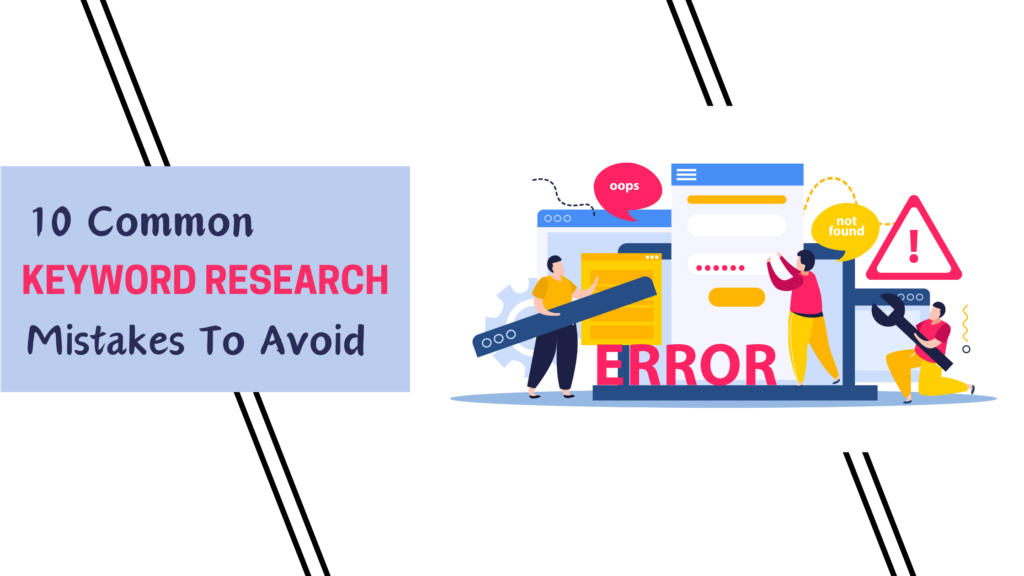Introduction Of Common Keyword Research Mistakes:
Keyword research is essential to any effective SEO plan. It lays the foundation for content creation, website optimization, and overall online visibility. However, despite its importance, many businesses and marketers fall prey to common mistakes that can hinder their efforts and impede their success in the digital landscape.
In this article, we’ll explore ten common keyword research mistakes to avoid. By identifying these pitfalls and understanding how to circumvent them, you can optimize your keyword research process and set yourself up for greater success in achieving your SEO goals.
What is keyword research?
Keyword research is the systematic process of identifying, analyzing, and selecting the specific words and phrases individuals use when searching search engines. It serves as the foundation of search engine optimization (SEO) and content marketing strategies, enabling businesses better to understand their target audience’s search behavior and preferences. By uncovering relevant keywords, businesses can optimize their website content to match the search intent of their potential customers, ultimately improving their visibility in search engine results pages (SERPs) and driving organic traffic to their site. Keyword research involves tasks such as brainstorming potential keywords, expanding the list using keyword research tools, analyzing metrics like search volume and competition, understanding user intent, conducting competitor analysis, prioritizing keywords based on relevance and feasibility, and implementing them strategically into website content. It’s an ongoing process that requires continuous monitoring and refinement to stay aligned with changes in search trends and user behavior.
10 Common Keyword Research Mistakes to Avoid:
- Neglecting to Define Goals:
Establishing clear goals for your keyword research can lead to aimless wandering in the vast sea of search terms. Before diving in, define your objectives, whether it’s increasing organic traffic, targeting specific demographics, or boosting conversions.
- Overlooking Long-Tail Keywords:
While broad, high-volume keywords may seem enticing, they often come with fierce competition. Neglecting long-tail keywords, which are more specific and less competitive, can result in missed opportunities to attract targeted traffic with higher conversion potential.
- Ignoring Search Intent:
Keyword research should go beyond identifying relevant terms; it should also encompass understanding user intent. Neglecting to consider the intent behind search queries can result in mismatched content that fails to meet users’ needs and expectations.
- Focusing Solely on Search Volume:
While search volume is an essential metric, it shouldn’t be the sole determinant of keyword viability. Prioritize relevance, user intent, and competition levels to ensure you’re targeting keywords that align with your objectives and have a realistic chance of ranking.
- Keyword Stuffing:
Stuffing your content with an abundance of keywords in an attempt to manipulate search rankings not only harms user experience but also risks penalties from search engines. Instead, focus on creating high-quality, informative content that naturally incorporates relevant keywords in a meaningful manner.
- Not Analyzing Competitors:
Competitor analysis provides valuable insights into keyword strategies that are working in your industry. Failing to assess competitors’ keyword targeting and performance means missing out on opportunities and overlooking potential threats.
- Forgetting Local SEO:
If your business serves a specific geographic area, neglecting local keywords can severely limit your visibility in local search results. Incorporate location-based keywords to optimize your presence for local audiences and capitalize on local search intent.
- Disregarding Seasonality and Trends:
Keyword trends and search patterns can fluctuate based on seasonality, current events, or industry trends. Failing to account for these fluctuations can result in missed opportunities or irrelevant content that fails to resonate with your audience.
- Not Using Data-Driven Insights:
Keyword research should be informed by data, not guesswork or assumptions. Leverage keyword research tools, analytics data, and other sources of information to guide your decision-making and ensure you’re targeting keywords with the greatest potential impact.
- Lack of Regular Review and Optimization:
Researching keywords is a continuous activity that needs to be reviewed and optimized frequently. Keep track of keyword performance, monitor changes in search trends and algorithms, and adjust your strategy accordingly to maintain and improve your rankings over time.
Conclusion:
Avoiding these common keyword research mistakes is essential for maximizing the effectiveness of your SEO efforts and achieving sustainable results. By prioritizing relevance, understanding user intent, and leveraging data-driven insights, you can refine your keyword research strategy and position your website for greater visibility, traffic, and success in the competitive world of online search.











